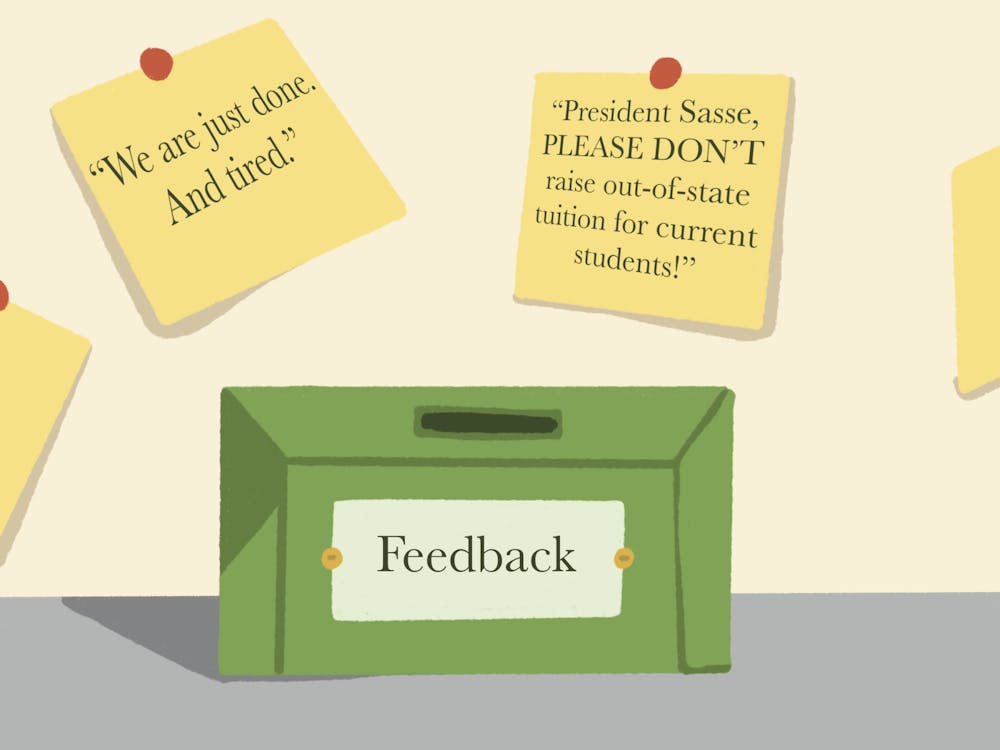UF faculty have expressed a mixture of support, skepticism and disdain for UF President Ben Sasse’s vision for the university’s future.
A total of 157 anonymous submissions to a feedback portal on the president’s website from August to September revealed the unfiltered opinions of UF faculty regarding Sasse’s strategic plan.
The feedback has helped “shape [administration’s] thinking” and “refined [its] options,” a UF spokesperson wrote in an email. “Just one example: it’s obvious that too much bureaucratic red tape exists, and it frustrates faculty. Nobody becomes a professor because they're passionate about paperwork. That’s a problem that became apparent as a result of some of these conversations, and it's a priority to fix.”
Sasse revealed his preliminary visions for UF in August in faculty-only “roadshows” across UF’s 16 colleges, where he discussed adjusting student tuition costs and improving the productivity of "quiet-retired" faculty through post-tenure review.
Sasse has predicted that low tuition costs, which are heavily subsidized by the Legislature and Bright Futures scholarships, can’t continue. In his roadshows, he said tuition is radically underpriced and "an economic model that doesn't make sense."
"We are the only state that loses money on every student," Sasse said in one presentation. "We should definitely be charging ability-to-pay for children of the wealthiest."
The anonymous feedback largely opposed any changes to the university’s tuition rates.
“President Sasse’s attack on Bright Futures makes it seem as if he is unaware of the financial reality that many students are facing due to the rapid increase in cost of living in Florida,” one faculty member wrote. “UF leadership needs to support, not attack, Bright Futures.”
One message, submitted to the portal 37 times, read: “President Sasse, PLEASE DON’T raise out-of-state tuition for current students! With room and board expenses, we’re barely able to afford a UF education for our freshman son. We allowed him to pursue his Gator dream — instead of paying significantly less at Binghamton University — under the fair assumption that $28k would remain stable for the final three years of his undergrad education. He loves studying in Gainesville and would be DEVASTATED if forced to transfer to a school in our home state (New York). Thanks for your understanding!”
The anonymous feedback generally criticized Sasse’s use of “quiet-retired” as “misplaced” and said it was based on anecdotal evidence.
Most faculty are productive despite low salaries, one faculty member wrote.
“Perhaps you do not realize the negative impact that your message has by admonishing what is overwhelmingly a high performing team of faculty,” they wrote.
Another faculty member wrote that Sasse’s assertion ignores “underlying burnout” from the pandemic and Florida’s political climate.
“It's not that we as a faculty don't wish to strive for excellence and high standards,” the faculty member wrote. “We are just done. And tired.”
Other submissions argued low productivity was the result of poor management from deans and unit leaders.
Not all feedback was against the term. One submission reported an IFAS faculty member as the “definition of quiet-retired” and “a blight on everyone around him that are trying to do their job.”
In his State of the University address, Sasse said new, state-mandated post-tenure review processes will help crack down on the low productivity of quiet-retired faculty.
The feedback showed a mixture of support and condemnation for post-tenure review.
“I for one am looking forward to post-tenure review and having a chance to show off my work to peers and administrators,” one submission read. “Post-tenure review — bring it on!”
Arguments against post-tenure review centered around whether its implementation was spurred by false narratives of “quiet-retirement” and uncertainty about what criteria will be used in the evaluations.
“The state's post-tenure review legislation is either based on random anecdotes that found their way to state legislators eager to condemn us or a political maneuver meant to bully us,” one faculty member wrote. “Please don't play a part in this farce.”
Faculty largely praised Sasse’s data-driven approach and said they felt more optimistic about his administration after the presentations. Others were not as hopeful.
“The future looks bleak at UF,” one faculty member wrote. “The faculty have rarely seen or heard from the president. When we have it has not been to inspire a vision of what UF aspires to become, but to chastise and patronize their efforts. All of this is why I am actively looking for the first opportunity out of UF. The pay is low, the support is weak, and the vision is absent.”
One submission wrote morale “has never been lower than it is now” and noted, “there is very little trust between faculty/staff and the state government.”
“I feel like the state has decided that we are the enemy,” they wrote. “We are hearing a lot about what we do wrong, yet very little about what we do right. Faculty are tired and beaten down. I feel like we perceive that you are an extension of DeSantis. You need to earn our trust.”
Contact Garrett at gshanley@alligator.org. Follow him on Twitter @garrettshanley.
Garrett Shanley is a fourth-year journalism major and the Spring 2025 university editor for The Alligator. Outside of the newsroom, you can find him watching Wong Kar-Wai movies and talking to his house plants.






